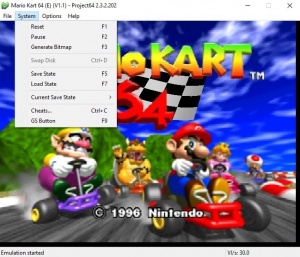|
|
| Line 1: |
Line 1: |
| | [[File:project64-3691-6.jpeg|thumb|right|An emulator playing Mario Kart 64]] | | [[File:project64-3691-6.jpeg|thumb|right|An emulator playing Mario Kart 64]] |
| − | Video game console emulation is the practice of emulating a video game console to allow video games that were originally designed to work on a target platform to work on another target platform. This process is achieved by creating software that emulates the technical behavior of the game's target platform (i.e. Nintendo 64) and importing game files to play on the emulator, effectively allowing video games to play on different platforms. While emulation can achieve the same experience as the original platform, it can also include several enhancements, such as graphical or sound features, save spaces, that aren't present on the original platform or game. Emulators can also be used as debuggers for the game and users can look see how the game is used in memory and even made modifications in the form of Rom Hacks.
| |
| | | | |
| − | Since its inception in the mid-1990s, video game console emulation has been a topic of controversy among gamers with critics claiming emulators are simply a vehicle for piracy while also being praised for preservation efforts as well as encouraging the homebrew community of making games as well as providing educational opportunities for users wanting to know about game development. Though the field of emulation began as a niche field for hobbyist developers on personal computers, it drew particular interest in the late 1990s when emulation efforts eventually caught up to emulating modern game consoles. Although they were eventually taken to court in accusations of piracy, they were found to be legitimate competition and are now considered legal entities today. Nevertheless, they remain controversial for their relative inability to prevent piracy and potentially make it much easier.
| |
| − |
| |
| − | == History of Video Game Emulation ==
| |
| − |
| |
| − | === Early Years with NES Emulation ===
| |
| − |
| |
| − | Console emulation is said to have started sometime in the mid-1990s when personal computers had finally possessed the processing power to sufficiently emulate another machine at an acceptable performance as previously such emulators would not have been able to run nearly as fast. At the time, however, personal computers could only emulate consoles from well over a decade ago, such as the Atari 2600 and the Nintendo Famicom/Nintendo Entertainment System, and even then the performance was less than that of the original machine. The emulators even lacked a lot of technical features they would be expected to have today. The hardware specifications for these machines were and still are a publisher secret meant only for the manufacturer, and so the emulators had to be built entirely from scratch using reverse engineering techniques and occasional guesswork to simulate the original hardware as closely as they could. Although early emulators were successful in emulating a handful of games at sufficient speeds, most of them lagged behind the original machines in terms of frame rate performance.
| |
| − |
| |
| − | This began to change during the mid-1990s when clever developers were able to sufficiently reverse engineer the CPU and PPU of the NES and came up with more efficient solutions that took advantage of the personal computer's newly integrated GPU drives, which were able to sufficiently emulate a Nintendo Entertainment System. Despite this success, emulation was still not well known to the public. Emulation at the time was seen as a complicated process of setup and installation, and even then few users had a powerful enough personal computer to run such games. Additionally, the only practical way to obtain game ROM files to use on the emulator was through piracy. Game ROMS were difficult to extract from the cartridge because of their unique hardware designs and few had access to modify machines to perform this. However, they were able to publish the ROMs illegally on ROM websites in a form of Internet piracy. This practice, combined with the technical issues of emulation, forced the community into secrecy and ensured it would not be mainstream to the public, which would draw the attention of companies like Nintendo and Sony.<ref>https://scholarlycommons.law.northwestern.edu/njtip/vol2/iss2/3/</ref>
| |
| − |
| |
| − | === The Fifth Generation and Lawsuits ===
| |
| − |
| |
| − | === Ongoing Mainstream Debate ===
| |
| | | | |
| | == References == | | == References == |
| | <references/> | | <references/> |
